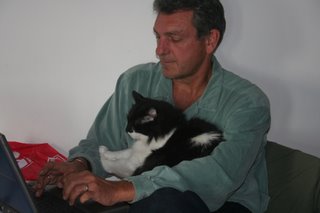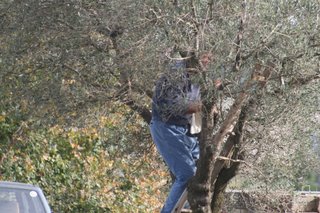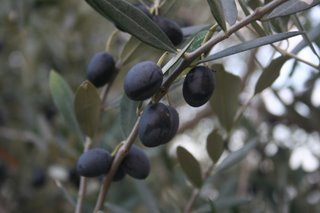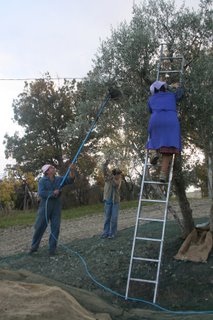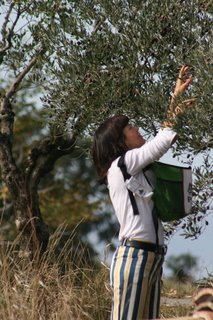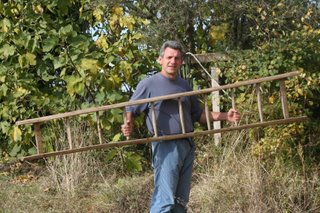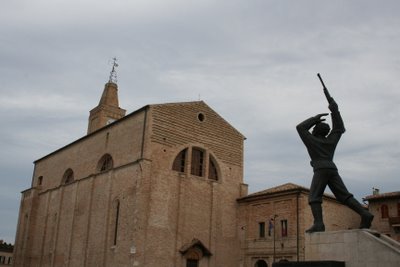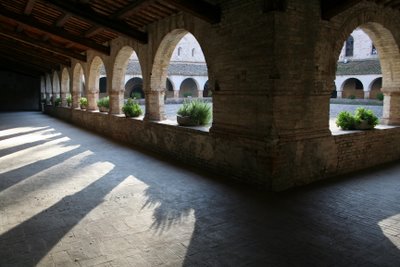 Granted, his cave was in a pretty amazing location – on a remote hillside on the banks of the Fiume Fiastrone in Le Marche. But 30 years of penance for his amorous failure? Apparently, he wasn’t the first to wallow in his rejection to such an extent, and indeed followed the example of St Francis, who also sold all his property and withdrew to meditate on his lot.
Granted, his cave was in a pretty amazing location – on a remote hillside on the banks of the Fiume Fiastrone in Le Marche. But 30 years of penance for his amorous failure? Apparently, he wasn’t the first to wallow in his rejection to such an extent, and indeed followed the example of St Francis, who also sold all his property and withdrew to meditate on his lot.Ugolini was a religious man, as his name implies (Beato = Blessed), and today there’s a little chapel near the site of his rather lengthy rumination. There’s a trail that leads there too, through stands of coniferous trees, and magnificent views of Lake Fiastra. Of course, being man-made, the lake wasn’t there when Ugolini undertook his meditative marathon back in the 1300’s, but I’m sure the view was no less impressive.

The creation of Lake Fiastra in 1950 as a hydroelectric project changed the whole area, as one might imagine. Quite dramatically, in fact. What was a collection of sleepy villages with an interesting history that predates the Romans, is now a tourist haven, particularly in the summer when windsurfers, fishermen, boaters, sunbathers, and promenade-walkers crowd its shores.
Our first visit to the lake’s tourist center, San Lorenzo al Lago, was well after the end of the “official” season in October. It was still busy, and when we went into a restaurant for a late lunch, a group of 30-odd leather-clad bikers was just leaving, having driven all the way from Rome to celebrate a birthday. We enjoyed a delicious meal there, which included cinghiale (wild boar), Julius’ favourite (thanks to Asterix & Obelisk).

Our visit to San Lorenzo followed a rewarding hike down into the depths of Gola de Fiastra, the gorge created by damming the river. The trail winds through what seems to be old-growth forest, teeming with all sorts of plant life, and criss-crosses the crisp waters of the Fiastrone river through its narrow canyon.
Apparently (according to a local friend) water is periodically released from the dam, flooding the gorge. This naturally conjures images of the standard Italian modus operandus of notifying people after they’ve done the deed, and it added a certain … edge, should we say, to the outing. Looking at the plant life down there, however, it didn’t look like there’d been a release for quite some time.
In addition to the chapel dedicated to Ugolini, the area has a number of sanctuaries, as well as few “rustic” hermitages, where religious recluses lived in caves. There are many in Marche, apparently a sort of clandestine infiltration tactic on the part of the various religious orders as a result of the marchigiani’s resistance to organized Christianity. Witchcraft, or stregheria, was once “the way” in these parts, as it was in the ancient Etruscan realms, and elements of it still survive, both separate from and integrated with established Catholic rites.
Beyond its religious history, archeological findings indicate that there have been settlements in the Fiastra area since around 2000 BC. The Romans also used it as a stopover on the way to the colonial capital of Urbs Salvia. Prior to being absorbed into the papal state in 1545, Fiastra fell under the respective domains of the Magalotti family (until 1259), and the Varano family – several castles serve as testament to this period of its history, the most notable (the 9th-Century Castello dei Magalotti) providing a sweeping vista over the lake and its surrounds. During its medieval and subsequent years, the area became known for its wool, flax, and hemp.

The construction of the dam in 1950 submerged many of the villages and hamlets that comprised the community. While the physical changes wrought by the flooding of the valley have been significant, it’s the drowning of the historical culture encapsulated in these Fiastrone communities that perhaps represents the greater change. Some of it survives – in its sanctuaries, its frescoes, its castles, and its ruins – but today “Fiastra” is more likely to conjure responses related to fishing, swimming, and sunning.
So be it. Life moves on. It was probably just as great a change when the Magalotti family started exerting its influence in the area some thousand years ago. But as we ramble along the valley …
 walk the trails on the valley walls … and visit the deserted hamlets and castles that remain … perhaps we should open our spirits to the voices that still speak of ancient tribal customs, colonial Rome, and medieval industry. It is, after all, what’s buried in the hills and under the lake’s waves … forever.
walk the trails on the valley walls … and visit the deserted hamlets and castles that remain … perhaps we should open our spirits to the voices that still speak of ancient tribal customs, colonial Rome, and medieval industry. It is, after all, what’s buried in the hills and under the lake’s waves … forever.





